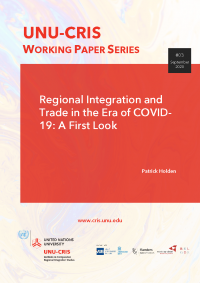Regional Integration and Trade in the Era of COVID-19: A First Look

COVID-19 has had a massive impact on regional and global trade. How is this affecting regional integration? Are regional institutions moving to become more autonomous or even protectionist economic blocs as the liberal trade system weakens? Or are they bastions of free trade and open-ness? More generally have they seized the opportunity to use their unique position to lead economic and public policy responses in their regions? To understand this, we first need to analyse the different types of trade and economic policy responses to COVID-19 and how they relate to regional integration.
This paper then analyses the response of the EU and four other regional institutions to the crisis (MERCOSUR, ASEAN, the EAC and ECOWAS). It considers the role of the institutions in terms of agency, exploring whether they have led collective action and/or coordination in trade and economic policy, as well as models of political economy. The EU is, as always, unique and there is evidence here that the crisis may lead (after an initial statist response) to a quantum leap in the economic autonomy of the Union. For now, it has not led to an illiberal backlash in international trade policy. For the other institutions, the response was overwhelmingly state-led and the regional role was more as a coordinator/norm promoter.
However, the initial response was always likely to be state-led and further research is needed, especially on their role combining trade and other functionalist public policy concerns in the future.
